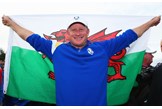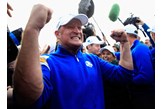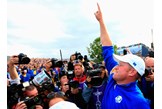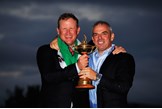Jamie Donaldson: Exclusive interview
Published: Last updated:
“Do you want me to stand on my tour bag?” No sooner have we agreed to Jamie Donaldson’s suggestion for an interesting picture than the Welshman is springing up onto his bag like an Olympic gymnast.
He balances precariously on and around his clubs, pulling funny poses and making jokes as if he doesn’t have a care in the world. Never mind the fact he’s risking damage to himself and his equipment just two days before he is due to begin his title defence at the Abu Dhabi Golf Championship.
That’s just the kind of guy Donaldson is. There’s a look of mischief in his eyes when you meet him, always a smile on his face and if you ask around on tour you’ll quickly realise he’s one of the funniest and most popular guys on the circuit. But in recent years, the 38-year-old has developed some serious game to go with his jovial character.
After a back injury disrupted four years of his career from 2004 to 2007, Donaldson has improved his Race to Dubai finish in each of the last six seasons – 89th, 59th, 46th, 38th, 19th and 5th last year. The real turning point came when he clinched his first European Tour title in his 225th tournament at the 2012 Irish Open. His second victory came just six months later as he fended off a field that included Tiger Woods and Rory McIlroy in the desert last year.
He recorded his first top-10 finish in a Major at the 2012 US PGA, made a hole-in-one in his Masters debut last year and his recent runner-up finish at the WGC-Cadillac Championship has lifted him into the world’s top 30 – and within touching distance of a Ryder Cup debut at Gleneagles.
We sat down for an entertaining chat with Britain’s newest golfing superstar – once he’d safely got down from his tour bag!
You turned pro in 2000 and recorded two Challenge Tour wins in 2001. How important was it to win that early in your pro career?
Very important, because it enabled me to get my European Tour card so I could move straight onto the main tour the following year. It’s a case of doing whatever you need
to get onto the European Tour, whether it’s loads of big finishes or a couple of wins. You just want to earn enough money to get your European Tour card.
Was the Challenge Tour a good grounding for life as a tour player?
It’s a great stepping stone to play tour golf. You play a lot of different golf courses and it’s got everything you need to learn about playing European Tour golf without the pressure. The courses aren’t quite as difficult, but they’re very good, and you’re playing a lot of golf and the competition is very tough.
How did you deal with the injury problems you had from 2004 to 2007?
It’s frustrating at the time, but everyone gets injuries and you’ve just got to hope you can find a way to overcome them and move on. It still affects me, but it’s more of a management process now.
You’ve improved your Race to Dubai finish every year from 2008. What’s been the key to making the step up?
Hard work! You’ve got to find ways to manage your game better, play better and score better through practice and learning where you’re dropping your shots.
Did you feel your first European Tour win at the 2012 Irish Open was well overdue?
Yes, of course it was. But I’d had four or five years in the wilderness where I didn’t know my arse from my elbow. Sometimes these things take time and you’ve just got to be patient and work to make it happen.
What got you out of that wilderness?
I changed a lot of things. There were things that weren’t working for me at the time. When you’re playing poorly and you’re doing whatever it is you’re doing, you’ve got to change it because it isn’t working. You’ve got to be real to yourself and say ‘it just isn’t working’. It’s not easy to find the solutions, but if you’re playing crap then you’ve just got to do the opposite of what you’re doing.
What were the low points?
In 2004 I would be scared of stepping off a curb just in case my back was going to go. That was the lowest point. My back wasn’t great at the time. But I spent a year in the gym, working on core stability exercises which enabled me to manage it. I don’t practise as much as I used to. I don’t do anything that might aggravate the problem.
How did the injury come about?
It was my own fault, really. I used to practise ridiculously long hours, to a point where I wouldn’t stretch afterwards or before, just waltz on to the practice ground and stay there all day hitting balls. Doing that for years and years, you’re going to have some sort of injury, so it flared up because of all the practice.
Didn’t one of the doctors you saw say you shouldn’t play golf again?
Yeah, one said don’t play. So we soon went to see somebody else!
That must have been very difficult to hear…
Well, to be honest, as soon as somebody says that, you just go and see somebody else.
I couldn’t hear that. That wasn’t what I wanted to hear. The guy that I did go and see, Jon Bowskill, said: “You need to do a load of exercising, core stability exercises.”
You joined forces with caddie Mick Donaghy the week you won the Irish Open at Portrush. What part has that relationship played in your rise?
He’s been very good. He’s been a nice addition to my golf team, if you like. The caddie I had before did a very good job, and we had a lot of really good finishes; we just hadn’t quite won. Then Mick came on board and we won the first event I played in. He’s got plenty of experience. He’s caddied for a lot of good players, so it’s great to have him on the bag. He knows what to do and when it matters. So yeah, he’s been really good and keeps me in a good situation, very calm, and always says the right things at the right time.
You landed your first Major top 10 at the 2011 US PGA. Do you now feel better equipped to contend at the Majors?
Definitely. It’s very important to play
well in the Majors because they’re the tournaments that really matter. It’s where you want to be and it’s where you want to be playing your best golf, so everything’s geared towards that.
Was the second win in the Abu Dhabi Championship last year as difficult as the first – or did that first win make it easier?
They happened in quick succession so it was great. They’re like London buses: you wait for ever for one to come and then suddenly two come at once. But at the end of the day, that’s what we’re here to do, to win golf tournaments, so you’ve got to get your head down and keep doing it.
How was your Masters debut last year?
It was incredible. It was hillier than it looks on the TV and the Par 3 Tournament is an amazing event. The par-3 12th is fantastic and to make an ace on the 6th hole in the
first round was a dream come true.
Had many aces before?
I think I’ve had four, two as an amateur, two as a pro. But I’ve holed a lot of shots on par 4s and 5s. I’ve had an albatross, and I think I’ve holed every iron in the bag, but I’ve only ever had four holes‑in‑one.
What did you learn last year that you’ll apply in the future?
Most of golf is experience. It’s about being in positions and getting used to it and playing courses and knowing them the year after. Every year you go back, you know them even more. The more you play in different events, the better you’re going to get at doing them.
You’ve accepted temporary membership of the PGA Tour for the rest of the season. Are you hoping to benefit from returning to courses for the second time?
It definitely makes the difference when you’ve played them before. Sometimes you can pitch up at a golf course and see the shot straight away, and there are some times you can’t. It’s nice to have played them before and come back and play them again. I’m now playing better in America. We are used to slightly different conditions on the European Tour, but I’m getting used to it. Everything I’m doing I’m getting better at, so I just need to keep working like I have been doing to compete more in Majors.
How high is the Ryder Cup on your agenda?
I’m in a decent position so naturally I’m thinking about it, but there’s a long way to go and I just want to play well from now until the team is decided. It would be a dream come true. I’m keeping my normal schedule and playing the tournaments I do better in and I’m going to play more in America to get used to it and better at playing over there. It’s important that I work hard and play well in the events I’ve got left because you want to be going into the Ryder Cup with a lot of form.
What do you think about people calling you a late bloomer?
I don’t feel old by any means! I’ve always been pretty much a late developer in most things, really. I left school before I could develop any there! So I had to play golf. My career has been up and down. Early on, I started off pretty good and then I had a big loss for four years after injury, and then I just had to regroup and do things that worked, work hard and keep believing. I just forced the wheel the other direction, and that’s what it’s done. I’ve found something that was working and just kept doing it and kept getting better at doing it, and then here we are getting better, again, so I’m happy.
Have you started telling yourself you’re one of the best players in the world now?
I think it’s been a progression. In 2008, 2009, I was just finding my feet after not playing well for two or three years. I was miles off playing well in Majors at that point. I think from 2008, every Order of Merit position in Europe and every World Ranking in the end of each year has improved. So the graph’s just going up. All I have to do is keep doing the same things and work hard and try to find little ways of improving to put myself in position more often.





